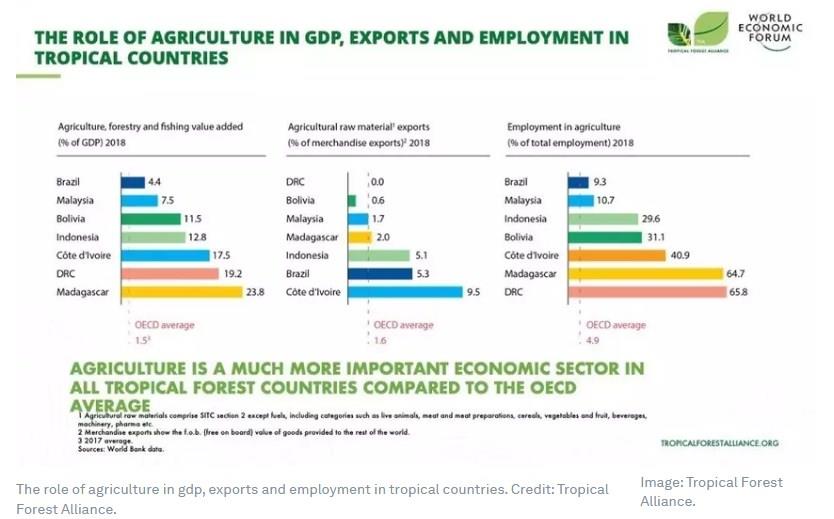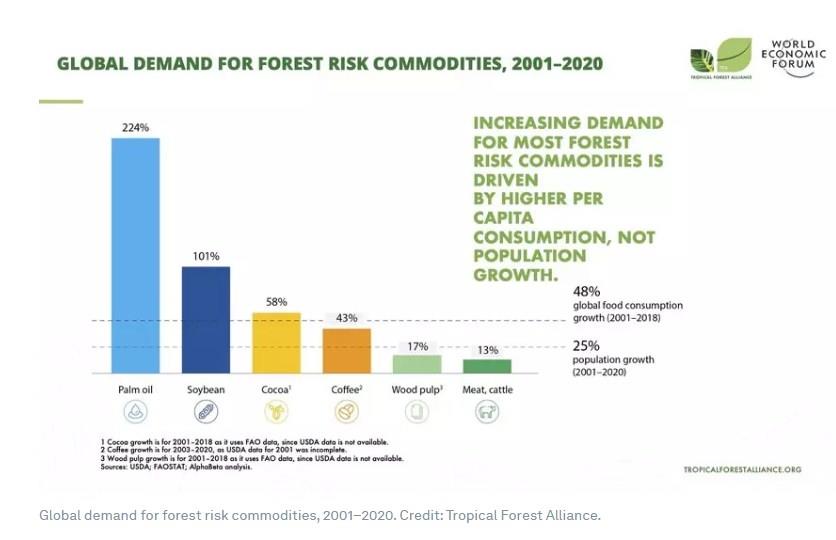by Petra Tanos*
As the mother of two small children – one of them born just a few months ago – imagining the world in which they will live can be dispiriting. I have spent my career working to advance sustainable agricultural supply chains, finding ways to help protect our natural resources, supporting the livelihoods of the people who grow our food and to make sure no one stays hungry. But when I look at the latest figures on tropical forest loss and food security and the findings of the latest IPCC Assessment Report, it doesn’t look like we have made much progress.
At times, it can feel like we are playing a game of “whack-a-mole”, focused so firmly on fixing one problem that we fail to consider the unintended consequences of our actions – exacerbating other equally pressing problems. Nearly one in three people in the world experience moderate or severe food insecurity. We can feed them, but this threatens some of the world’s most valuable and vulnerable ecosystems. We can work to remove deforestation from supply chains, but this can result in the exclusion of smallholder farmers from global markets that contribute to their livelihoods.
In the Forests, Food Systems & Livelihoods report issued by the Tropical Forest Alliance, we examine the global trends and the supply and demand dynamics of key commodities produced in the tropics. The report makes the case for tackling issues of deforestation in tropical regions with systemic solutions that are designed to enhance rural livelihoods, ensure food security and support economic development – while keeping forests standing.
The facts are stark
Globally, the annual consumption of food and agricultural products rose by about 48% between 2001 and 2018, growing at more than twice the rate of increase in the human population. In the last 20 years, per capita protein consumption has risen by 45%. There are significant positive developments behind these figures. Since 2001, 160 million people have been lifted out of undernourishment, and the number of undernourished people globally has declined in absolute terms, even as the population was growing.

Agricultural production has been an important driver of exports and employment in many tropical forest countries. Soybeans are now the most valuable export product for Brazil, and around 16.3 million people (12% of the total workforce) are employed in the palm oil industry in Indonesia. However, these developments have well-documented environmental consequences. Global Forest Watch (GFW) shows that since 2002, more than 60 million hectares of primary forest have been lost in the tropics, equivalent to an area the size of France, and the vast majority – more than 80% – of tropical deforestation occurs in landscapes where agriculture is the dominant driver.

Confronting competing priorities
As we look to the future, the global middle class is expected to continue increasing by a further 1.8 billion between now and 2030, and this economic growth will continue to push increases in per capita consumption. This, coupled with tropical countries facing a shrinking agricultural labour force, by as much as 20 million by 2030, suggests that business as usual will not work. Not when it comes to rural development models, nor to the approaches we have taken to tackling these complex problems in the last decade.
We can no longer operate in silos, working to stop commodity-driven deforestation in one arena, and tackling food security in another. Feeding a growing population, protecting critical ecosystems and sustaining the livelihoods of rural communities are competing priorities. We need to be able to confront the trade-offs and have difficult, nuanced conversations across stakeholder groups rather than treating these problems in isolation.
The need for breakthroughs
These interconnected issues of food security, economic development and environmental protection are the bread and butter of the Tropical Forest Alliance, where they work with companies, governments and civil society to enable dialogue that can bring about the systemic solutions needed for sustainable food and land use transitions. The Forests, Food Systems & Livelihoods report offers ideas on how to reframe the challenge in a way that can contribute to deeper dialogue, understanding and breakthroughs. These include:
-A food systems approach holds promise. Commodity-driven deforestation and the conversion of other critical ecosystems cannot be treated in isolation, as an environmental issue, or a supply chain problem, because it sits at the heart of the challenges facing global food systems.
-Improving rural livelihoods must be at the centre of solutions and mobilizing finance to create incentives for farmers to conserve more while producing food is critical. The Innovative Finance for the Amazon, Cerrado and Chaco initiative is a good example of how this can be done.
- Tailored supply and demand-side measures are required with specific solutions designed on a commodity-by-commodity and region-by-region basis.
-Corporate action must continue with leading companies raising the bar with ambitious efforts both on individual supply chains and sector-wide transformation to contribute to reduced net deforestation. To support this, greater investment in transparency and improvements in collaborative data frameworks is needed.
-Policy innovation that challenges assumptions and includes producer voices is a must. Given the complexity of the problem, it is crucial to avoid introducing policies with unintended consequences, as we have already seen with the impact of biofuel mandates on land use.
What we are facing is not just a “forest” problem or “food” challenge or “livelihoods” issue. Success can only be achieved through collective action and collaboration, working across silos and geographies, sectors and stakeholders. Ultimately, we are all on the same team. There are hundreds of millions of people out there who want a world where people aren’t hungry, where farmers are thriving and where trees are standing – for the sake of all those here and all those yet to come.
*Head, Strategic Partnerships, Tropical Forest Alliance
**first rublished in: www.weforum.org




 By: N. Peter Kramer
By: N. Peter Kramer

